|
|
|
Sort Order |
|
|
|
Items / Page
|
|
|
|
|
|
|
| Srl | Item |
| 1 |
ID:
172136
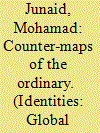

|
|
|
|
|
| Summary/Abstract |
This article examines practices of resistance that thwart Indian state’s control over everyday life in Kashmir. The state frequently uses ‘curfew’ to dominate public space, shut down ordinary mobility, and suppress pro-independence politics. Curfews are enforced through punitive prohibitions and by activating the militarised infrastructure built to reinforce Indian rule over the region since 1947. Yet, Kashmiris are not passive objects of this control. Through overt and hidden practices of resistance and disobedience, like sangbāzi and, what I call, counter-mapping, they keep their aspirations for independence alive, while rebuilding a semblance of everydayness under the occupation. Desire to walk freely becomes the key metaphor for freedom from military control. Based on ethnographic and theoretical material, the article makes a case that in spaces under long-term military occupations political subjectivity is primarily expressed and enacted as a bodily demand to become visible in public space.
|
|
|
|
|
|
|
|
|
|
|
|
|
|
|
|
| 2 |
ID:
172134
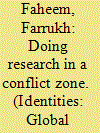

|
|
|
|
|
| Summary/Abstract |
This paper argues that in conflict zones like Jammu and Kashmir, the embodied stories of Kashmiris punctuate the past, often silenced by dominant Indian narratives. Narratives about certain key political events in the region's past co-exist with other forms of memory. Kashmiris weave these stories to make sense of the present, build connections to the past, and stake claims for the future. They build and nourish an archive based on lived experience, keeping a record of past wrongs. Novels, anecdotes and underground literature form part of this embodied archive, and provide a resource for recovering stories that remain silent in institutional archives which serve the interests of power. These interests are visible through restrictions on access to institutional archives, and demonstrate the effects of power and the overall politics of archives.
|
|
|
|
|
|
|
|
|
|
|
|
|
|
|
|
| 3 |
ID:
172138
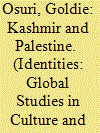

|
|
|
|
|
| Summary/Abstract |
This paper explores the itineraries of anti-colonial solidarity between India & Palestine and argues for placing Kashmir’s anti-colonial struggle for sovereignty in these itineraries. Examining routes of solidarity through transnational and translocal assemblages, the essay highlights the need for critical reflection on anti-colonial solidarity. The paper is also an argument for the need for anti-colonial solidarity with Kashmir and Palestine to take account of the context of contemporary geopolitical alliances within global capitalism, which indicates a (settler/post) colonial formation.
|
|
|
|
|
|
|
|
|
|
|
|
|
|
|
|
| 4 |
ID:
172133
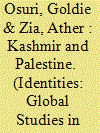

|
|
|
|
|
| Summary/Abstract |
What features of contemporary coloniality emerge if we examine geopolitical alliances across settler and ‘post’ colonial contexts? What forms of solidarity become necessary in the context of these colonialities? Referencing the historical and contemporary features of the occupations of Kashmir & Palestine, the introduction to this special issue makes the case for naming the states of India and Israel as part of a contemporary geocolonial formation. Naming and framing require understanding present forms of coloniality and reflexive solidarity. The essays in this special issue form an archive of coloniality and solidarity through which the authors examine the minutiae of living and of dying, of assembling archives from below, and of building and decolonising solidarities across Kashmir & Palestine.
|
|
|
|
|
|
|
|
|
|
|
|
|
|
|
|
| 5 |
ID:
172135
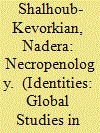

|
|
|
|
|
| Summary/Abstract |
In theorising penal politics, this article investigates the marking of the colonised through an analysis of state violence over dead bodies. Delving into and describing the political scene in which the state – through its courts, law, military, and police – leaves dead bodies bleeding after death, withholds them in carceral refrigerators, and tortures their communities, uncovers what I define as necropenology. Developed from the voices of Jerusalemite families whose children were imprisoned after death, this paper argues that expanding spaces of carcerality, criminalising those who are already dead, and penetrating Palestinian spaces of mourning, illustrates new modes of penology, a necropenology. Necropenology conquers new bodies, psychics, and territories in life and in death through the performance of power that marks both dead and living bodies as disposable. Jerusalemite families articulate first-hand how this form of power strips control of one’s own emotions, inscribes indignities, and keeps the colonised as dangerous entities, always on trial in death and when dead.
|
|
|
|
|
|
|
|
|
|
|
|
|
|
|
|
| 6 |
ID:
172139


|
|
|
|
|
| Summary/Abstract |
Both Palestine and the Indian held Kashmir have become hallmarks of a postcolonial siege manifest in heavy militarisation, illegal occupation, human rights violations, and an excruciating love born from and for people’s resistance and solidarity. While different, strong overlaps exist between the two conflicts in having been midwifed by the waning British Empire in 1947; subsequent internationalisation and fighting against a type of contemporary international politics that subsumes them under so-called ‘Islamic terrorism.’ Also noticeable is the motif of ‘suffering’ that makes the tragedy of Kashmir resonate with the pathos of Palestine. This paper focuses on the vantage from Kashmir, where people herald the Palestinian struggle as pioneering and a beacon of just struggle. I illustrate how Kashmiris, have come to harbour for the Palestinians an ‘affective solidarity’ which is evident in their modes of resistance to lend support for the liberation of Palestine and credibility to the Kashmir’s own resistance movement.
|
|
|
|
|
|
|
|
|
|
|
|
|
|
|
|
| 7 |
ID:
172137


|
|
|
|
|
| Summary/Abstract |
The contemporary turn to the settler-colonial framework has allowed an emerging and growing generation of activist-scholars working on Palestine-Israel to think about decolonisation as an alternative to the official conflict-management-focused peace process. This framing has allowed for the articulation of a range of rich and complex discussions concerning the making and unmaking of settler-indigenous relations in Palestine-Israel, as well as the possibility for decolonial cohabitation. This paper’s contribution to this ongoing conversation is to theorise the ways in which the widespread adoption of the settler-colonial framework by Israeli and international solidarity activists active in the nonviolent struggle against the West Bank Separation Wall has contributed to the evolution of a praxis of decolonial solidarity articulated through the strategic mobilisation of vulnerability vis-à-vis the violence, repression and dispossession of the settler-colonial state.
|
|
|
|
|
|
|
|
|
|
|
|
|
|
|
|
|
|
|
|
|